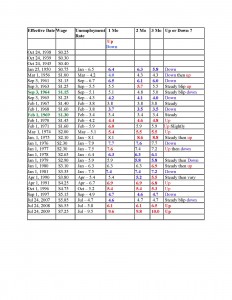Republicans consistently say that raising the minimum wage will hurt employment. If that is true it should show up in the overall employment data. If raising the minimum wage hurt employment then unemployment should go up after the minimum wage is raised. So the unemployment rate should be higher in the months after the wage is raised.
The following chart sets out the change in unemployment rate in the months after the minimum wage was changed.
[Here’s a link to a bigger version of the chart: http://thedisappointedoptimist.com/wp-content/uploads/2015/02/Change-in-Unemployment-and-Minimum-wage.pdf]
The national minimum wage was established in 1938. It has been changed 28 times since then. It has been raised 26 times, and lowered 2 times. Unfortunately the Bureau of Labor Statistics does not have data before 1950, so we don’t have records of the impact of the raise in the minimum wage before, but since 1950 the wage has been changed 26 times. It has been raised 24 times, and lowered twice.
If raising the minimum wage forces employers to lay off workers then the opposite should be true. Lowering it should spur hiring. But the scant statistics we have don’t really support this. The minimum wage was lowered from $1.25 per hour to $1.15 per hour in September 1964. The next month the unemployment rate was the same. It went down slightly, from 5.1% to 4.8 percent the next month, then up slightly to 5.0% the month after that. The wag was lowered from $1.60 to $1.30 in February 1969, but in the following three months the unemployment rate remained exactly the same at 3.4%. So, from the two statistically insignificant samples we have, lowering the rate doesn’t have much of an impact on hiring. But two data points are not persuasive.
Turning now to the twenty four raises in the minimum wage. Republicans make the claim that raising the minimum wage as an absolute, without nuance or equivocation. If that is true then the unemployment rate should rise every single time the wage is increased. But this has not happened. From the chart it is clear that the unemployment rate has gone down in many cases, in up in many cases. In the first month after the change, the unemployment rate went down ten times, and up eight times. So employment increased ten times after the minimum wage was increased, but it did decrease eight times after the raise. It stayed the same eight times. So the claim that raising the wage will, absolutely and without fail, lead to rises in unemployment is clearly not true.
One month is not a statistically valid sample, so I looked at unemployment over a three month period after the rate was raised. In most cases the rates jumped around a bit. In nine cases the unemployment rate went down and stayed down over a three month period. In seven cases in went up, and stayed up. In most other cases it jumped around. A few times it went up then down, and a few times it went down then up.
One important point to note: if you look at the unemployment rate charts of any year you will notice that they are constantly moving, going up and down. There are innumerably factors that impact the employment rate. These rates are “seasonally adjusted” so they take in to consideration the increased retail employment in November and December, and the increased construction employment in the summer months.
Based on this data I can say that raising the minimum wage does not cause unemployment. It is a canard. It sounds logical, but statistics do not support the contention.
